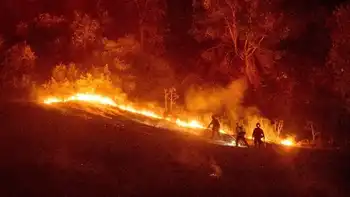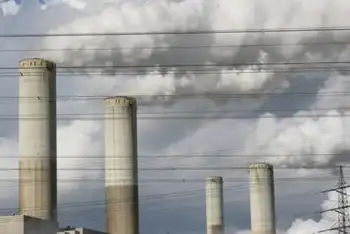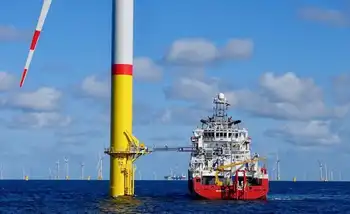Deeply green city confronts energy needs
By New York Times
NFPA 70b Training - Electrical Maintenance
Our customized live online or in‑person group training can be delivered to your staff at your location.

- Live Online
- 12 hours Instructor-led
- Group Training Available
W. S. Sampath, a professor at Colorado State University, inspecting a solar panel prototype.
But now two proposed energy projects are exposing the hard place that communities like this across the country are likely to confront in years to come as the tangled nuances of thinking globally come back to bite.
Both projects would do exactly what the city proclaims it wants, helping to produce zero-carbon energy. But one involves crowd-pleasing, feel-good solar power, and the other is a uranium mine, which has a base of support here about as big as a pinkie. Environmentalism and local politics have collided with a broader ethical and moral debate about the good of the planet, and whether some places could or should be called upon to sacrifice for their high-minded goals.
The solar project, called AVA Solar, plans to use a new manufacturing process developed at Colorado State University here to make panels for electricity generation, and will use cadmium — a hazardous metal linked to cancer — as part of the industrial process.
The company that would run the proposed uranium mine, Powertech Uranium, would like to drill down through part of an aquifer about 10 miles northeast of town using what the company says would be state-of-the-art drilling technology to extract fuel for nuclear-generated electricity.
Some politicians who agree on almost nothing else have united in expressing concerns about the mine — especially its possible effect on water quality — including Representative Marilyn Musgrave, a Republican who represents the area, and Senator Ken Salazar, a Democrat.
Local environmentalists like Dan Bihn, an electrical engineer and environmental consultant who sits on the Fort Collins Electric Utilities Board, are caught in the middle.
“I think nuclear needs to be on the table, and we need to work through this thing and we can’t just emotionally react to it,” Mr. Bihn said in an interview at Mugs Coffee Lounge, an environmentally correct cafe near the university, where the take-out forks are biodegradable.
Asked about his own emotional reaction to the mining plan, Mr. Bihn paused. “Deep down inside, my emotional reaction is that we should never do this,” he said.
The central thorn in Fort CollinsÂ’s dilemma, some land-use and energy experts say, is that local and global simply do not mean what they once did.
“Politically it’s going to become more complicated,” said Bill Klein, the director of research at the American Planning Association, a nonprofit group that works with local governments. “There’s always been this weighing of our individual desires against the greater good, but now we’re becoming much more attuned to a global responsibility,” Mr. Klein said. “We’ve got to question some of the knee-jerk responses that we’ve had in the past.”
What green energy even means these days is probably the next question to ask.
Gov. Bill Ritter Jr., a Democrat who was elected last year and who has made what he calls “the new energy economy” a centerpiece of his administration, does not include uranium mining in the green portfolio, said Tom Plant, the director of the governor’s energy office. Mine regulators still handle questions about uranium, Mr. Plant said.
Ron Cattany, the director of the division of reclamation, mining and safety at the Colorado Department of Natural Resources, said that Powertech had not yet filed a formal application, but that the hurdles to opening any kind of new mine in Colorado, regardless of the location, were high.
There is no doubt that new money is chasing new energy. Company officials at Powertech, which is based in Denver, said they had spent more than $2 million so far buying land, or the option to buy, in the area where their proposed drilling would take place. They bought the minerals beneath the surface last year for an undisclosed price, and under what is called “split estate,” that gives them title to the uranium, no matter who owns the land on top of it.
Test drilling in the 1970s confirmed the existence of about 9.7 million pounds of uranium in deposits under 5,700 acres, according to the companyÂ’s Web site. At the current market price, which has risen about 30 percent in the last year, the ore would be worth about $860 million.
Mr. Cattany said that 10 other uranium projects — all involving the possible reopening of mothballed mines that use traditional open cut or underground methods, and all on the state’s less-populated western side — had come into a formal review or staff consideration over the last year as uranium prices shot up.
Powertech has proposed using what is called in-situ mining — chemicals are injected into the ground, releasing the uranium, which is then pumped to the surface. The process was developed in the 1950s and 1960s, but has never been used in Colorado for commercial mining, state officials said.
At least $250 million, meanwhile, has flowed into solar, wind and ethanol projects in Colorado over the last few years as well, according to state figures, and officials at the new solar company said they were seeing their share of the tide.
“We’re not hurting,” said Russ Kanjorski, the director of strategic planning for AVA Solar. Mr. Kanjorski declined to say how much the start-up costs might be for a factory, but said the company intended to build up to a production level of 4.5 million solar panels a year beginning in 2009, employing up to 500 people, mostly engineers. “Funding is not an issue for us,” he said.
Mr. Kanjorski said that the environmental protections in using cadmium would be tight and that he expected the state would take a very close look at the water discharge and monitoring practices in particular, which he said were still being developed.
Jeff Lebesch, another member of the cityÂ’s utility board, said he worried that the popularity of some energy projects could make for bad public policy.
“I think there is a risk that the popular ones have some things overlooked,” said Mr. Lebesch, who is also a co-founder and president of New Belgium Brewing, a 16-year-old company that has been a leader in pushing energy conservation and renewable sources like wind power. As for nuclear power, Mr. Lebesch said he was not opposed, if the energy was really needed.
“The big issue of power plants is carbon emissions,” he said, “and nuclear plants don’t have them.” The fuel is the bigger issue for him. Extracting uranium, processing it and disposing of it, he said, all have long-term, unresolved questions.
A spokesman for Powertech, Lane Douglas, said the companyÂ’s proposal should be judged on facts, not beliefs or prejudices or what he conceded was a spotty environmental record for uranium mining.
“The science will either be good science or it won’t,” said Mr. Douglas, the company’s Colorado land and project manager. “We’re just saying give us a fair hearing.”
Ariana Friedlander, an advertising sales representative, who was having lunch at Mugs on a recent afternoon, said she was trying to be consistent. Ms. Friedlander said she opposed the mine but thought the solar factory should be closely regulated, too.
“I don’t know of anyone who’s really for it,” she said of the mine. “But we shouldn’t be giving the other guys a pass because they’re sexy right now.”











